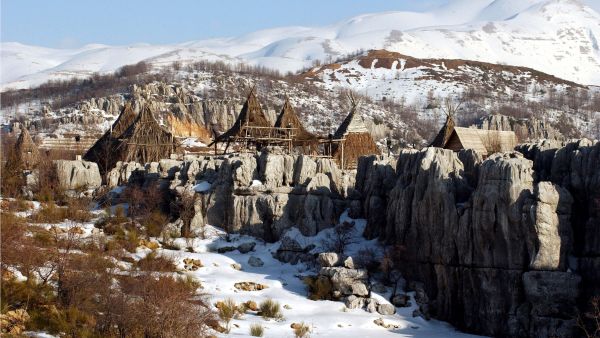BEIRUT: Rooftop bars, beaches and bustling Beirut streets choked in Ferrari-dosed car fumes have steadily fought to dominate the international picture of Lebanon, replacing the image of bullet-riddled buildings and scars left over from decades of civil war.
The accompanying tourism boom, however, has been grotesquely uneven, with the overwhelming majority of it centered in the capital and confined to the hot summer months.
Gradually, alternatives have sprung up with visitors also lured to the wine fields of the Bekaa Valley and the ancient ruins in Baalbek and Tyre as part of their visit, but Lebanon’s natural beauty has been grudgingly slow to catch on as an attraction of choice.
However, for a select and growing group of ecotourists this as-yet-untapped market offers tremendous potential for growth and promises to provide not only a fun and affordable option, but one which could help alleviate a large number of wider socio-economic problems.
“The tourism we promote is responsible,” said Gilbert Moukheiber, managing director of 33 North, an alternative tourism company operating since last June. “Before this type of tourism came about, there was no concept of how to do things and people would just come and take pictures. The impact could quite often be negative for the local community.”
The activities offered by ecotour operators are definitely a break from the mundane and include a range of year-round excursions for all ages, from whitewater rafting to snowshoeing and “snow survival” that involves building, and living inside, your own igloo for several days on end.
“I started going on the ecotourism excursions about two years ago and since then I have become firmly dedicated. I wait all week just so I can go on the treks,” said physiotherapist Narwan Hitti. “I go every weekend and take my 9-year-old daughter with me whenever possible.
“I would advise every family and every Lebanese to go. The experience – the silence, the peace, the real nature and the authentic rural Lebanon that you see – are simply unparalleled.”
Catering for all ability levels, the trips encompass challenges ranging from kids’ camps and light day-long walks to mountain climbing. They can also include overnight stays in local guesthouses where visitors lodge with local communities and indulge in native food, music and entertainment.
“We live with the villagers and we all share our different experiences of living in the rural parts of the country or the city,” said Hitti. “It makes each appreciate what they have.”
This type of tourism has been widely heralded for its ability to foster a sense of environmental responsibility among the visitors and local community alike.
“Nature in Lebanon has been attacked from all sides by new highways and savage buildings … but we need to show people the complexity and beauty of the often-ignored parts of Lebanon,” said Michel Moufarege, head of Liban Trek, the country’s first ecotourism operator, which has operated since 1997.
“One of our leading mottos has always been to preserve the natural environment and to make the local communities aware of the importance of their natural surroundings and to not be ashamed of their status.”
Thousands of people, including many foreigners, go on the excursions each year, but recruiting new fans has thus far proved challenging.
“It is extremely difficult to convince people to go and try something different,” said Hitti. “People have to change their mentality. They are completely stuck in their ways and only like going to the same old restaurants time and again.
The wider objectives of ecotourism also include improving the socio-economic conditions of rural communities and creating a sustainable local tourism model.
“We believe that you should ask the local community what they want,” said Moukheiber.
Consequently, 33 North has already trained over 70 local guides to shepherd tourists for a more authentic experience and has also joined forces with numerous local cooperatives and groups to promote community-based growth.
Safa al-Hek, a medical practitioner from the village of Koueikh in Hermel, runs a participating cooperative “Oak,” which works to empower women by helping them turn traditional arts and handicrafts into products for sale.
The cooperative, like many others teamed with ecotourism operators, produces natural and organic goods and sells local olives, nuts, fruits and jams.
“Since [ecotourism] came, the number of visitors to the village and the area has increased considerably,” said Hek. “[The visitors] are also of a higher quality, more respectful of our culture and also of the surroundings.”
Operators claim that their projects are helping to spread social change, while unifying neighboring villages by pushing them to develop communal strategies for tourism development.
“Before [ecotourism] women used to work at home, they didn’t have social contacts. Now they are more and more involved in their work and we are seeing big economical growth for them,” said Hek. “Women have gained in self confidence and they love their work. It is also helping to create equality between men and women … ”
Hek has big plans for her cooperative and soon hopes to open a traditional restaurant where the food would be 100 percent traditional.
“We want to make it totally organic where everything is served just like our grandparents ate it,” she said.
The project, currently awaiting international funding, includes the whole village and is benefitting the entire community, she said.
Progress, however, is slow, with operators complaining that the Tourism Ministry has neglected the industry until only recently.
“People were just laughing at me in 2006 when I wanted to promote Lebanon as a natural tourist destination and show that it is so much more than just Jeita or Baalbek,” said Moufarege.
“Unfortunately the activity is still very much confined to foreigners and middle-class families,” he said.
Also, like so much else in Lebanon, hiking and adventure tourism fluctuates with the unstable political situation although it has help make small inroads into strengthening national unity. The ecotourism community was instrumental in the founding of the Lebanon Mountain Trail, which passes through 70 different towns and villages, weaves its way from north to south Lebanon. The annual 28-day trek, spanning some 440 kilometers, is scheduled for April.
“People need to realize that development is not just roads and tarmac,” added Moufarege. “We need to preserve our mountain trails which can act as a network, bringing the whole of Lebanon together.”
By Simona Sikimic








